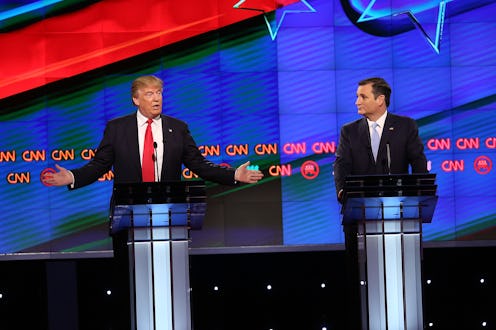News
Why A Contested Convention Is Even More Likely Now
The threat of a contested Republican National Convention has been looming for weeks, and after Tuesday's primary in Wisconsin, it seems more like a promise. Ted Cruz's win over rival Donald Trump was decisive, but also troubling for those who would rather avoid the political frenzy of a contested convention. As July inexorably approaches, a contested convention seems more likely than ever, especially after the Wisconsin primary.
First off, and most importantly, there's the delegate math. Trump raised his count to 743, while Cruz raised his to 517, which is a relatively tight margin to start with. With only 16 primaries and 882 delegates still up for grabs, there's still room for either man to win the the nomination outright; it's just incredibly unlikely. Trump would have to sweep New York, Pennsylvania, California, Indiana, and New Jersey, while Cruz would have to sweep nearly every single remaining primary to pull it off. What's much more likely to happen, given the voting trends in this election, is the two candidates splitting the winner-take-all-by-district states, fighting tooth and nail for each delegate until the final primary.
However, there's another reason Trump's path to the nomination seems more tumultuous now than before: his slipping facade. His loss in the Badger State highlights the bad PR the campaign's been dealing with for the last several weeks. Between the candidate's abortion comments which broke the internet and the charges brought against his campaign manager, Corey Lewandowski, Trump is losing the air of invulnerability which has helped shield him from the criticism that other candidates face. Now that he seems like less of an unbeatable media-wielding machine, his victory in the forthcoming primaries seems less assured.
Finally, the mix of states that still remains is ideologically split. Trump has done well in mid-Atlantic and Northeastern states, with victories in Virginia and Massachusetts, so he's got a strong chance to take a majority of the delegates on Super Tuesday Part Four, when Pennsylvania, Connecticut, Delaware, Maryland, and Rhode Island vote. After that, it might be Cruz's time to shine. He's won many of the Midwestern and evangelical states thus far, including Iowa and Idaho, which gives him an edge on states like Indiana, Nebraska, and West Virginia, which will vote in May. The regional differences increase the likelihood that no one candidate can garner enough delegates to claim the nomination, and that the convention will hence be forced to move forward to a contest.
A contested convention would be one of the most politically exciting events in years, especially in this tense, high-stakes election. As it becomes more and more likely, the dynamics of the entire campaign could change. You may have thought that the candidates already pulled out all the stops, but this may be just the beginning.
